 ALABANZA New and Selected Poems 19822002 Martn Espada
ALABANZA New and Selected Poems 19822002 Martn Espada  W. W. Norton & Company New York London Adjusting type size may change line breaks. Landscape mode may help to preserve line breaks. OTHER BOOKS BY MARTN ESPADA POETRY A Mayan Astronomer in Hells KitchenImagine the Angels of BreadCity of Coughing and Dead RadiatorsRebellion is the Circle of a Lovers HandsTrumpets from the Islands of Their EvictionThe Immigrant Iceboys Bolero TRANSLATION The Blood That Keeps Singing: Selected Poemsof Clemente Soto Vlez (with Camilo Prez-Bustillo) EDITOR El Coro: A Chorus of Latino and Latina PoetryPoetry Like Bread: Poets of the Political Imaginationfrom Curbstone Press ESSAYS Zapatas Disciple Copyright 2003 by Martn Espada All rights reserved First Edition For information about permission to reproduce selections from this book, write to Permissions, W. W.
W. W. Norton & Company New York London Adjusting type size may change line breaks. Landscape mode may help to preserve line breaks. OTHER BOOKS BY MARTN ESPADA POETRY A Mayan Astronomer in Hells KitchenImagine the Angels of BreadCity of Coughing and Dead RadiatorsRebellion is the Circle of a Lovers HandsTrumpets from the Islands of Their EvictionThe Immigrant Iceboys Bolero TRANSLATION The Blood That Keeps Singing: Selected Poemsof Clemente Soto Vlez (with Camilo Prez-Bustillo) EDITOR El Coro: A Chorus of Latino and Latina PoetryPoetry Like Bread: Poets of the Political Imaginationfrom Curbstone Press ESSAYS Zapatas Disciple Copyright 2003 by Martn Espada All rights reserved First Edition For information about permission to reproduce selections from this book, write to Permissions, W. W.
Norton & Company, Inc., 500 Fifth Avenue, New York, NY 10110 Book design by Chris Welch Production manager: Anna Oler The Library of Congress has cataloged the printed edition as follows: Espada, Martn, 1957 Alabanza : new and selected poems 19822002 / Martn Espada.1st ed. p. cm. ISBN 0-393-05192-7 1. Hispanic AmericansPoetry. Title. Title.
PS3555 .S53 A78 2003 811 .54dc21 2002152905 ISBN 978-0-393-32621-5 ISBN 978-0-393-35207-8 (e-book) W. W. Norton & Company, Inc., 500 Fifth Avenue, New York, N.Y. 10110 www.wwnorton.com W. W. Norton & Company Ltd., Castle House, 75/76 Wells Street, London W1T 3QT Gloria a las manos que la mina excavaran.
Gloria a las manos que el ganado cuidaran. Gloria a las manos que el tabaco, que la caa y el caf sembraran... Para ellas y para su patria, alabanza! alabanza! Glory to the hands that dug the mine. Glory to the hands that cared for the cattle. Glory to the hands that planted the tobacco, the sugarcane and the coffee... For them and for their country, praise! Praise! Juan Antonio Corretjer, Oubao-Moin ACKNOWLEDGMENTS Some of the new poems included in this collection have appeared or will appear in the following publications, to whose editors grateful acknowledgment is made: El Andar: Sing Zapatista Caf Review: Ezequiel, The Poet in the Box Cide: Now the Dead will Dance the Mambo Hanging Loose: Alabanza: In Praise of Local 100, Contemplation Hopscotch: Ezequiel, The Poet in the Box, Circle Your Name The Massachusetts Review: Ghazal for Open Hands Modern Haiku: Sheep Haiku The Nation: Alabanza: In Praise of Local 100 Peacework: Ghazal for Open Hands Photographers, Writers and the American Scene: Ezequiel Ploughshares: Now the Dead will Dance the Mambo, Inheritance of Waterfalls and Sharks, The Monsters at the Edge of the World, En la calle San Sebastin Poetry Ireland Review: Offering of Stones The Progressive: Parole Hearing, Searching for La Revolucin in the Streets of Tijuana Quarterly West: Offering of Stones Sahara: Sing Zapatista U.S.
Latino Review: The Poet in the Box Waxwing: Ghazal for Open Hands Worcester Magazine: Parole Hearing Many thanks to Doug Anderson, John Deane, Cola Franzen, Katherine and Klemente Gilbert-Espada, Frances Goldin, the Rub Theater Company, Camilo Prez-Bustillo, Leroy Quintana, Ilan Stavans, and Michael Veve for their support. This book is dedicated to my family It hunches with a brittle black spine where they poured gasoline on the stairs and the banister and burnt it. The fire went running down the steps, a naked lunatic, calling the names of the neighbors, cackling in the hall. The immigrants ate terror with their hands and prayed to Catholic statues as the fire company pumped a million gallons in and burst the roof, as an old man on the top floor with no name known to authorities strangled on the smoke and stopped breathing. Some of the people left. Theres a room on the third floor: high-heeled shoes kicked off, a broken dresser, the saints portrait hanging where it looked on shrugging shoulders for years, soot, trash, burnt tile, a perfect black lightbulb to remember everything.
And some stayed. The old men barechested, squatting on the milk crates to play dominoes in the front-stoop sun; the younger ones, the tigres, watching the block with unemployed faces bitter as bad liquor; Mrs. Bez, who serves coffee on the third floor from tiny porcelain cups, insisting that we stay; the children who live between narrow kitchens and charred metal doors and laugh anyway; the skinny man, the one just arrived from Santo Domingo, who cannot read or write, with no hot water for six weeks, telling us in the hallway that the landlord set the fire and everyone knows it, the buildings worth more empty. The street organizer said it: burn the building out, blacken an old Dominicanos lungs and sell so that the money-people can renovate and live here where an old Dominicano died, over the objections of his choking spirit. But some have stayed. Stayed for the malicious winter, stayed frightened of the white man who comes to collect rent and borrowing from cousins to pay it, stayed waiting for the next fire, and the siren, hysterical and late.
Someone poured gasoline on the steps outside her door, but Mrs. Bez still serves coffee in porcelain cups to strangers, coffee the color of a young girls skin in Santo Domingo. Far from beggars hands searching in cities of Iberian cobblestone, the mountains rest, a council of elders drowsing in the market square. The rain forests are steaming and sluggish, green palm and broken rock broad like the cheekbones of an extinct people. Older than suffering: the mountains are shamans, guarding the caves from archaeologists; the mountains are guerrilleros, rising together to swallow terrified armies; the mountains are peasants, great shoulders breaking the earth to spring forth crops. Lares, Jayuya, Utuado, towns of the mountain where rebellions song wept like slaves in the joy of abolition, rang like a machete forged by insurgent blacksmiths, raged like a rainstorm deep in the chest of mountains.
We are of mountains. Descended from Tano carvings, Spanish watchtowers, African manacles, the jbaro plow, the only glimpse a Victorian photograph of minor officials, shirtsleeved and tough; a brick from the house where my father was born. I will disappear in Borinquens mountains, lost among boulders, drinking from mottled creekbeds, exploring unknown gardens, discovering hungry shacks and wild sow in green pltano thicket, searching, like those beggars hands, for bread and sight and salvation. for Frank Espada It was 1947. Tato was getting a tryout with the New York Yankees. The only Puerto Rican allowed on the neighborhood team, he always stayed for the fight after the game, shouts and the skidding of spikes on asphalt.
He was seventeen years old, a brownskinned boy with big hands who oiled his glove every day. He could see the seams on the ball from four hundred feet; he could hit it into the distance with a sweeping grace. From the batting cage he could wallop a white blur to ricochet off a stadium billboard or the pitchers leg. The scout told Tato he had the most natural swing since Ted Williams. He almost had a tryout with the New York Yankees, but the alarm clock didnt work that morning. It was the spring of 1947.
There were no brownskinned boys in the American League. And the New York Yankees gave no more tryouts; they broadcast the message sent by overdue bills and losing lottery tickets. Tato still played ball. He had to. He still had that swing, and he had to hit something. He played semipro, the industrial leagues, first base for the tool and die company, stealing home in the crippled old stadium outside Jersey City the pitcher had this crazy windup, so he just left third and walked across the plate remembering, in front of the ballgame on TV, how the white guys put the spikes in his neck on the double play, fifteen dollars a night and a bus ride to the waterfront towns.
Next page
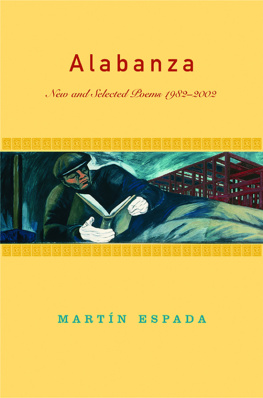
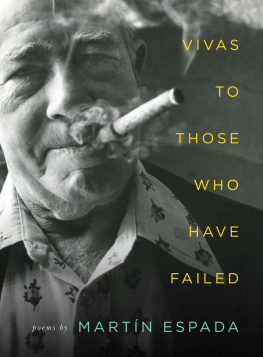
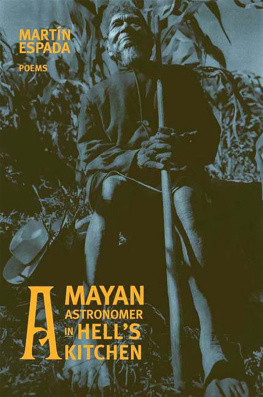
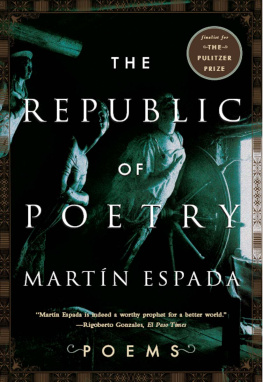


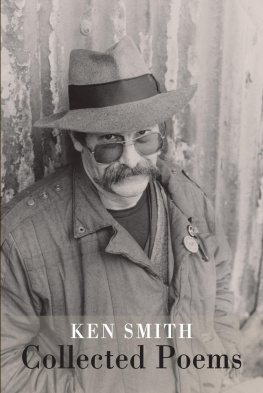



 ALABANZA New and Selected Poems 19822002 Martn Espada
ALABANZA New and Selected Poems 19822002 Martn Espada  W. W. Norton & Company New York London Adjusting type size may change line breaks. Landscape mode may help to preserve line breaks. OTHER BOOKS BY MARTN ESPADA POETRY A Mayan Astronomer in Hells KitchenImagine the Angels of BreadCity of Coughing and Dead RadiatorsRebellion is the Circle of a Lovers HandsTrumpets from the Islands of Their EvictionThe Immigrant Iceboys Bolero TRANSLATION The Blood That Keeps Singing: Selected Poemsof Clemente Soto Vlez (with Camilo Prez-Bustillo) EDITOR El Coro: A Chorus of Latino and Latina PoetryPoetry Like Bread: Poets of the Political Imaginationfrom Curbstone Press ESSAYS Zapatas Disciple Copyright 2003 by Martn Espada All rights reserved First Edition For information about permission to reproduce selections from this book, write to Permissions, W. W.
W. W. Norton & Company New York London Adjusting type size may change line breaks. Landscape mode may help to preserve line breaks. OTHER BOOKS BY MARTN ESPADA POETRY A Mayan Astronomer in Hells KitchenImagine the Angels of BreadCity of Coughing and Dead RadiatorsRebellion is the Circle of a Lovers HandsTrumpets from the Islands of Their EvictionThe Immigrant Iceboys Bolero TRANSLATION The Blood That Keeps Singing: Selected Poemsof Clemente Soto Vlez (with Camilo Prez-Bustillo) EDITOR El Coro: A Chorus of Latino and Latina PoetryPoetry Like Bread: Poets of the Political Imaginationfrom Curbstone Press ESSAYS Zapatas Disciple Copyright 2003 by Martn Espada All rights reserved First Edition For information about permission to reproduce selections from this book, write to Permissions, W. W.